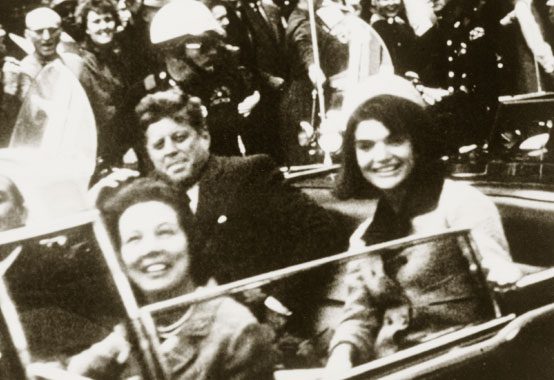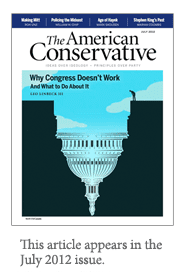To Save JFK

History is the best story: you can’t make that stuff up. It takes an Olympian imagination to render historical events believable, much less comprehensible. The most outlandish part of Stephen King’s 11/22/63 is its account of the real life and adventures of Lee Harvey Oswald and his shadowy mentor George de Mohrenschildt. Compared to that farrago of double lives, the time-travel fantasy plot seems unexceptional.
Readers don’t turn to Stephen King for belles lettres, but his writing habits are highly effective for storytelling, plot development, character composition (or decomposition), and other such homely virtues. King specializes in what T.S. Eliot called life’s “partial horror.” He’s a master at seeing the grinning skull beneath the skin, the manic gleam in the eye of the quiet neighbor, the evil that somehow permeates whole towns. He understands how a Thing can be hungry and want to feed upon whatever is at hand: fear, jealousy, shame, regret, anger, weakness—even love and happiness.
Almost a quarter-century ago, Tom Wolfe wrote in “Stalking the Billion-Footed Beast: A Literary Manifesto for the New Social Novel” (Harper’s, November 1989) that he had expected to be overrun and outdone by countless writers scrambling to render the American experience—creating the “literature worthy of her vastness” that social-realist Sinclair Lewis called for in his 1930 Nobel Prize speech—only to see the contemporary novel reduced to a mere “literary game.”
What happened to the legacy of Zola and Balzac, Dickens and Thackeray? Here Wolfe applies the same analysis to American literature that he earlier applied to the visual arts (“The Painted Word”) and architecture (“From the Bauhaus to Our House”): “The intelligentsia have always had contempt for the realistic novel—a form that wallows so enthusiastically in the dirt of everyday life and the dirty secrets of class envy and that, still worse, is so easily understood and obviously relished by the mob, i.e., the middle class.”
The intelligentsia look down not only on realism but on all the popular genres: mysteries, war stories, bodice-rippers, Westerns, spy thrillers, science fiction, horror, and humor. But a lot of good writing, and the best storytelling, can be found in those genres, on the page and on screens both big and small, from “The Sopranos” to “My Name Is Earl.”
Why do serious writers flee realism? Out of despair, Wolfe says, at being unable to keep up with a reality that grows more fantastical by the day:
The imagination of the novelist is powerless before what he knows he’s going to read in tomorrow morning’s newspaper. … [Yet] the answer is not to [abandon] the rude beast … the life around us … but to do what journalists do, or are supposed to do, which is to wrestle the beast and bring it to terms.
Stephen King has always enjoyed a good wrestle with the beast. He made his debut with Carrie in 1974, nearly four decades ago, and has been mulling over the big idea behind 11/22/63 for some time. The novel required years of historical research and plumbing his own memories of growing up in the 1950s. The plot is this: Jake Epping is a 35-year-old high-school English teacher in Lisbon Falls, Maine, who is convinced by a dying friend to check out a portal into the past—11:58 a.m. on September 9, 1958, to be exact—that he’s discovered in the rear pantry of his diner.
Each time Jake breaches the portal, the past “resets,” effacing any alterations he has previously made. He ages at a normal rate while in the past, although only two seconds have elapsed in the present whenever he returns. Jake soon signs on to his friend’s urgent mission: to prevent the Kennedy assassination by first spying on Oswald to ascertain that he’s the lone assassin, then eliminating him. Save JFK, they figure, and the evils that come after—including escalation of the Vietnam War (“Is the butcher’s bill that high if Kennedy doesn’t die in Dallas?”), the MLK and RFK assassinations, the riots, and maybe even Tricky Dick himself—will no longer ensue.
If there were ever an act considered 100 percent righteous by my generation, it would be preventing the death of John Kennedy. His murder was a live horror movie even before we were allowed to watch the Zapruder tape. The ’50s were as close to sweetness and light as any cohort of kids has ever come; the ’50s ended brutally with the trauma of November 22, 1963. Then carnage in color on the nightly news, riots, more assassinations. Yes, we’d believe Jake’s mission could make the world objectively and quantifiably happier.
But first Jake has to wait five years for 1963 to roll around. The plan, as King contrives it, is to be sure Oswald acts alone in his April ’63 attempt to kill General Edwin Walker. If he does, that should mean Oswald will also act alone in Dallas. Unfortunately, this assumption turns out to be illogical and even perverse.
“The past is a foreign country; they do things differently there,” wrote L.P. Hartley in The Go-Between. As King has Jake accustom himself to living in the past, it’s fascinating how he chooses to view the America of a half-century ago through modern eyes. First he notices the mind-blowing debasement of our currency—the bills still marked “Silver Certificate,” the coins made of actually valuable metals. And the prices: comics five cents each, gas 19.9 cents a gallon, cars for a few hundred bucks, ground beef 54 cents a pound, complete dinners 95 cents, a revolver for $9.99. Ron Paul can speechify about sound money, but literature transports you back to it.
Next noticed are the trust and friendliness of a more innocent time, the doors and cars left unlocked, the unworldliness, the corniness, the much more pronounced regional identities. Unselfconscious references to God. Kids playing outside till dusk. Happy upbeat music and fun movies. Nights dark enough to display stars, quiet enough to hear crickets. And “the huge and stately elms” that are all gone now.
Then there are the vibrant downtowns, the up-and-running industrial base, trains chuffing, oilfields roaring, the dignity of manual labor, the un-PC conversations, the absence of GPS tracking systems, the lack of a national ID system, no intrusive cell phones or nagging email.
Mid-century America is a feast for Jake’s senses, if not always a pleasant one: “I was deciding that 1958 had been a pretty good year. Aside from the stench of the mill and the cigarette smoke, that was.” No legislative campaigns to stamp out smoking, no EPA to shut down factories, no health Nazis whinging about trans fats, salt, and sugar. “This fifty-years-gone world smelled worse than I ever would have expected, but it tasted a whole hell of a lot better.”
The greatest downside, of course, is the treatment of black Americans. King resists the temptation to introduce one of his black savior/martyr figures like Dick Hallorann in The Shining, Mother Abigail in The Stand, or John Coffey in The Green Mile. King has been a prime purveyor of the “Magic Negro” trope. But he means well—he lives in Maine, after all. And he movingly points out in 11/22/63 that second-class citizenship for American blacks meant a separate and unequal quality of life.
The one serious anachronism I find in King’s recreation of this almost incredible world—which I found credible only because I once lived there myself—is his characters’ foul mouths. He seems to think nice people, even young Southern women, would have used four-letter words with abandon back then. On the contrary, even “hell” and “damn” were reserved for the most dire situations. What Tom Wolfe has called the “f–k patois” was unknown outside the military, prisons, or core ghettos.
As the novel progresses, the depthless mystery of Lee Harvey Oswald meets the Man Who Wasn’t There, George de Mohrenschildt. The latter was clearly an instigator and enabler of Oswald, but why? If we don’t know exactly who he was—and no one denies he had ties to reactionary White Russian circles and the CIA—or exactly who Jack Ruby was—and no one denies he was a mobster—how can we assess Oswald’s true role? Just because de Mohrenschildt wasn’t with Oswald the night he aimed at Walker doesn’t mean he didn’t goad the younger man into doing it. Or set him up for ultimate patsyhood.
As it turns out, the past does not quite reset every time Jake dips into it. There is a raving wino who seems to function as a gatekeeper stationed next to the portal, whom Jake is advised to give a 50-cent piece to in order to pass unmolested—like paying the boatman to be rowed across the Styx to Hades. After several trips, Jake finds the guy with his throat cut; the next time, another man rushes up and begs Jake to quit meddling, telling him that every time the past is altered, “it gums up the machine. Eventually a point will come where the machine simply … stops.” Apparently each portal or “bubble” is manned by a guardian whose protests are becoming more and more feeble. One is strongly reminded of the Republican Party and its candidates. Diminishing returns, and reaching into the past to cherry-pick events is much like government reaching into society to pick winners and losers.
 After Jake kills Oswald in the book depository and returns to 2011, the world has indeed been changed, but overwhelmingly for the worse. The alternate history he triggered has led to nukes being used, climate change, pollution, impoverishment, political chaos, neotribalism—a real equal-opportunity dystopia. Heeding the gatekeeper at last, he returns one final time to let history happen.
After Jake kills Oswald in the book depository and returns to 2011, the world has indeed been changed, but overwhelmingly for the worse. The alternate history he triggered has led to nukes being used, climate change, pollution, impoverishment, political chaos, neotribalism—a real equal-opportunity dystopia. Heeding the gatekeeper at last, he returns one final time to let history happen.
Incomparable as they might be, 11/22/63 has something in common with Tolstoy’s War and Peace aside from their great length and their shared understanding that people most love to read stories about people: both books deal with theories of history and how it is made. Tolstoy wonders what history would have been like without Napoleon, just as Stephen King wonders what it would have been like without the Kennedy assassination.
For King, the “obdurate” past “doesn’t want to be changed.” Time resists being tampered with. History happens, history is what happened, and history wants to happen. Moreover, “The resistance to change is proportional to how much the future might be altered by any given act.” For Tolstoy, the forces of history are far greater than the will of any man. What appears in 20-20 hindsight to have been willed by one or many individuals only “came about step by step, moment by moment, event by event, as a result of the most diverse circumstances”:
The human mind cannot grasp the causes of phenomena in the aggregate. But the need to find these causes is inherent in man’s soul. … To the question: What causes historic events? an answer presents itself, namely, that the course of world events is predetermined from on high, and depends on the coincidence of the wills of all who participate in those events, and that the influence of a Napoleon on the course of such events is purely superficial and imaginary.
“Predetermined from on high” is another way of invoking King’s notion of the obdurate past. The Greeks called it moira, fate; their tragedies show how the more violently one struggles to evade his destiny, the more tightly it embraces him. Jake’s sobering travels through time reveal to him “a universe of horror and loss surrounding a single lighted stage where mortals dance in defiance of the dark.” To King, that is humanity’s hell, and its ultimate hope.
Marian Kester Coombs writes from Crofton, Md.